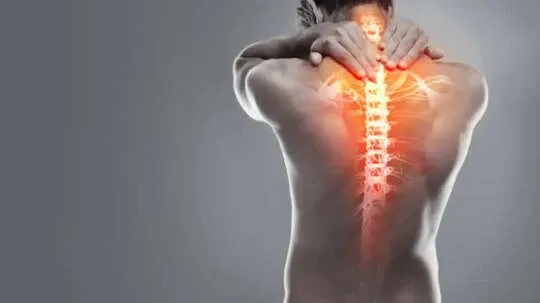But how can you tell if the pain is a muscle or a disc issue?
According to experts, pulled muscles often heal themselves or with very little intervention, but a slipped disc can be more dangerous if not detected and treated.
What is back pain?
Experts say your primary back muscles - which include latissimus dorsi, rhomboids, trapezius, and erector spinae - provide stability to the shoulders, lower back, and core. And since all are connected, it can lead to pain reaching throughout your body.
Muscle soreness can happen due to injury or too much stretching of your muscles during workouts and exercise. When that happens, the fibers in your muscles break down, which means they are working to repair themselves and become stronger and healthier.
Also, experts believe muscle pain does not always mean that your muscles are breaking down fibers and getting stronger but could also be due to a tear. Apart from pain, it can hinder movement and posture.
What is a slipped disc?
A slipped or herniated disc is a condition where the soft inner material of an intervertebral disc pushes through a tear in its outer layer, which happens either due to a physical strain or an age-related issue.
Apart from pain, it can cause symptoms like numbness, tingling, and even weakness in an arm or leg.
The difference between muscle and disc pain
Doctors say the main difference between the two types of pain is the location, as the spinal disc is at the bottom of your back, so if there is pain in the lower back, it can be due to a slipped disc. It is also really sharp and radiating pain, which travels down the leg, commonly known as sciatica. A slipped disc also worsens with movement, coughing, or sneezing.
However, muscle strains will feel like post-workout soreness.
How to fix back pain and a slipped disc?
Doctors say it is important to figure out the right issue so that proper treatment can begin as soon as possible. According to experts, back pain can improve gradually with rest, gentle stretching, hot and cold compression, and over-the-counter pain relievers.
To fix a slipped disc, apart from proper rest, you need intense pain management and physical therapy. In some persistent cases, decreased muscle tone can lead to the possibility of doctors recommending an epidural injection of cortisone, which helps reduce inflammation and swelling.
Experts believe that, in rare cases, a large and ruptured slipped disc may also injure nerves to your bladder or bowel, which may require emergency surgery.
